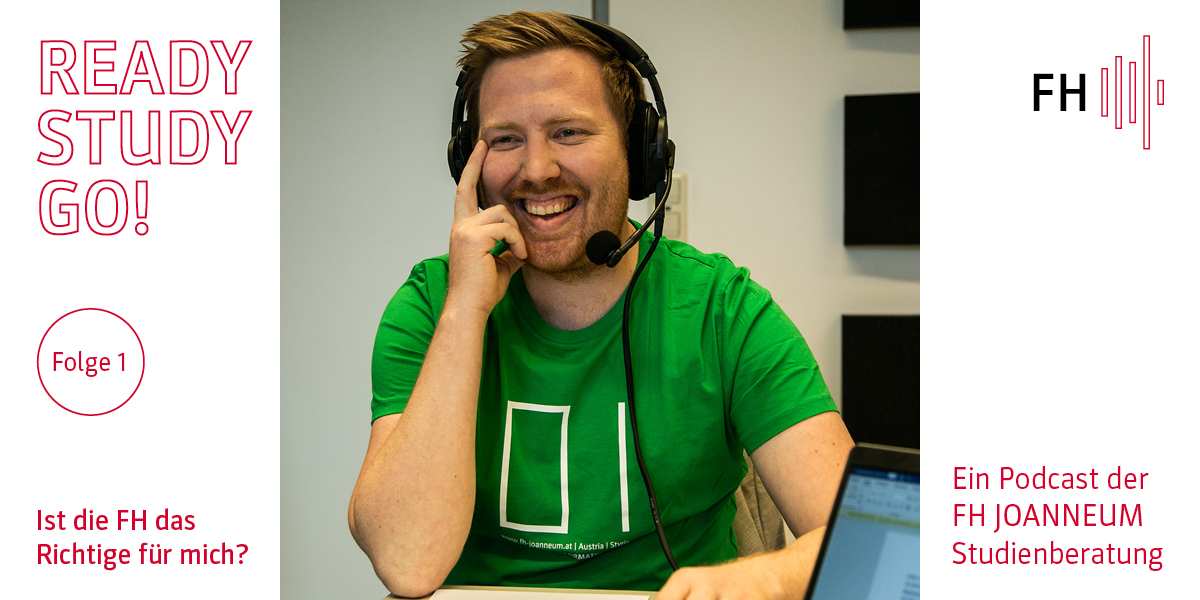The path to your dream degree is often paved with many questions. In the “Ready, Study, Go!” podcast, the student counseling center of FH JOANNEUM provides all the answers.
#01 Ready, Study, Go: Is FH right for me?
Course guidance Anna-Magdalena Druško, 07. March 2023
In this episode, we deal with a question of whether a university of applied sciences – FH – is the right choice for you. Thomas Höller, an employee of the student advisory service, provides insights into FH JOANNEUM and universities of applied sciences in general. You can listen to the podcast (in German) here:
You are currently viewing a placeholder content from Third Party. To access the actual content, click the button below. Please note that doing so will share data with third-party providers.
Summary
FH JOANNEUM is one of the largest universities of applied sciences in Austria, with three locations in Styria: Graz, Kapfenberg, and Bad Gleichenberg. Our bachelor’s and master’s degree programs are divided into six departments: Applied Computer Science, Building, Energy and Society, Engineering, Health Studies, Management, and Media & Design.
What are the advantages of a university of applied sciences?
Practical-oriented studies: You study with a practical orientation and are very well prepared for your entry into the profession. The study content is both scientifically and practically oriented. You work on concrete projects and have many instructors who come from professional practice and pass on their current know-how directly to their students. In addition, a mandatory professional internship is always required.
Limited number of study places: In each degree program, there is a predetermined number of study places. Therefore, you always have to apply for a study place at a university of applied sciences and go through an admissions procedure.
Fixed study plan, personal supervision: The study programmes at FH are clearly organized. Attendance is mandatory for courses. The schedule is predetermined, and you do not have to put it together yourself. You have direct contact with your instructors and always have a contact person for your concerns.
Guaranteed places in lectures and laboratories: You will be supervised in small groups and do not have to worry about a laboratory place. This allows you to concentrate fully on your studies and complete them in the predetermined time. A bachelor’s degree program at a university of applied sciences lasts six semesters.
Tuition fees: There are no tuition fees at FH JOANNEUM. Scholarships and study grants are available to university of applied sciences students, just like to university students.
Applied research: Research is also conducted at FH JOANNEUM. While basic research is highly valued at universities, the focus here is on application-oriented research and development.
Excellent job opportunities: A university of applied sciences trains for a specific profession or an entire field of work. The high proportion of practical training here enables a direct entry into professional life. The job market has a high demand for students with practical experience. During your study programme you make many contacts with possible employers: through teachers, fellow students, graduates from higher years and at career fairs on site.
What study forms are available at the university of applied sciences?
Full-time: the “classic” study form. The lecture times are from Monday to Friday during the day, and the individual lectures are coordinated with each other.
Part-time: organized so that full-time employment is possible alongside studying. Lecture times are usually on Friday afternoons and Saturdays. Many lectures also take place online.
Work-friendly: organized so that part-time employment is possible alongside studying. Usually, you have one lecture-free day per week.
Co-op: conducted in collaboration with a training company. The theoretical units are held at the university of applied sciences, and the practical phases take place at a company.
Is studying at a university of applied sciences more time-consuming than at a university?
No. Bachelor’s degrees are indicated with 180 ECTS at both universities and universities of applied sciences. ECTS is the abbreviation for European Credit Transfer and Accumulation System. This is the European recording system for the academic achievements of students. These credit points result from the estimated time or estimated workload that students need to complete individual lectures, modules, labs, etc. This estimated time includes, among other things, attendance at lectures, internships, self-study, exam preparation as well as final papers and final exams. One ECTS corresponds to approximately 25 hours of workload. This system regulates that a degree requires the same amount of effort – regardless of the type of university. It also has the great advantage that you can switch from a bachelor’s degree at a university to a university of applied sciences for a master’s degree and vice versa. This is also true internationally, especially in the European higher education sector.
*In Austria, there are universities, teacher colleges and universities of applied sciences (Fachhochschulen). Each institution has its own areas of focus. Universities of applied sciences are focused on professional training with a strong emphasis on practical application and research. At FH JOANNEUM, one can study full-time, part-time, while working, or in a co-op study program. Studying at a university of applied sciences offers the advantage of linking theory and practice, cross-disciplinary teaching, and a fixed study duration. Students study in small groups and have excellent job prospects upon graduation. *







